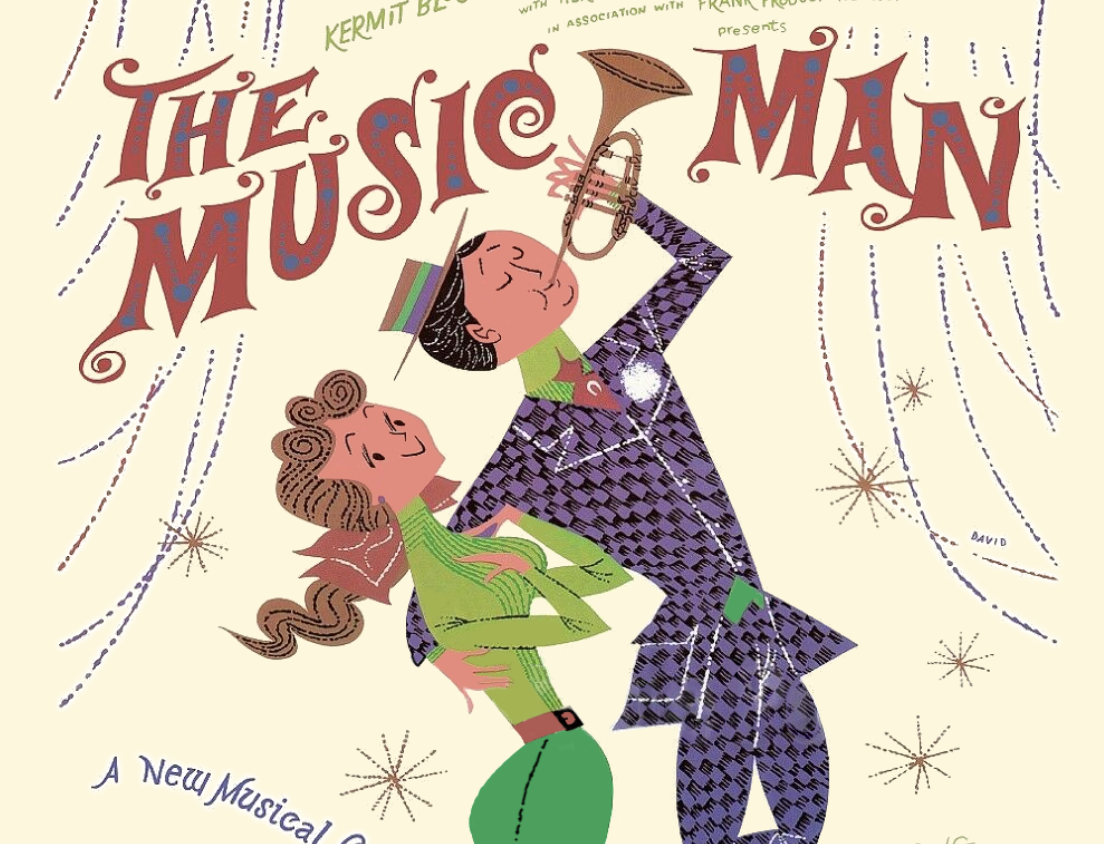Once in a while professional stage director Kirk Boyd comes out of retirement to give local theater lovers a welcome taste of his theatrical magic. After a long career working at the Oregon Shakespeare Festival, and later managing his own Willamette Repertory Theatre in Eugene, he knows exactly how to satisfy audiences yearning to be surprised, delighted and enlightened, even if they may have seen a show numerous times.
With his direction of Meredith Willson’s The Music Man, which opened at The Shedd July 7, he does precisely that, helped by music director Robert Ashens and a large cast of all ages brimming with talent. So many actors have performed over the years at The Shedd that they seem like an extended family, and indeed, some of them are members of three actual families.
I’m sure you know the plot. Charming con artist travels the country circa 1912, selling mail-order musical instruments and uniforms with the promise of forming a kids’ band (no longer designated as a “boys’ band” in recent productions). Since he knows nothing about music, in each town he cozies up to the local piano teacher, getting her to corroborate the need for a band.
But in quaint River City, Iowa, known for its stubborn population, he meets his nemesis. He falls in love with Marian Paroo, a 26-year-old librarian-piano teacher (beautifully played by Cyra Conforth), and reveals an unexpected streak of kindness when he learns that her little brother Winthrop (delightful Eliyah Chandler) suffers from a serious lisp and the loss of his father.
When the inimitable Robert Preston portrayed Harold Hill in the first Broadway run of The Music Man starting in 1957, he was 39 years old. For the 1962 movie, he was 44. No wonder Harold was ready to settle down with Marian, even though he didn’t know it.
The Shedd’s Harold Hill, Tate Foshay, a college senior, is considerably younger. Without strictly imitating Preston’s Hill, Foshay instead seems to channel Hill’s ambitious and slightly desperate spirit.
The River City that Hill encounters is full of eccentric characters. He manages to transform a feuding school board, played by Mark Norwood, Matthew Leach, Nehemiah Nance and Owen Colley, into a harmonious barbershop quartet.
Blustery Mayor Shinn (Earl Ruttencutter) mangles his words so badly that he could serve as an example for Winthrop. A lisp won’t hold him back in life. Heidi Turnquist is formidable as Eulalie, the mayor’s wife. Isabella Willis is amusing as their daughter Zaneeta, as is Matthew Michaels as Zaneeta’s secret boyfriend, Tommy Djilas.
The songs are as good as it gets in musical theater — every single one. “Seventy-Six Trombones,” “Ya Got Trouble,” “Marian the Librarian,” “The Wells Fargo Wagon,” “Till There Was You” and all the others.
The Music Man is one of musical theater’s most uplifting, nostalgic portrayals of life in Middle America, life as we might imagine it during a happy, innocent time. But after seeing productions of it for nearly my whole life, I’m discovering a deeper meaning, and I can’t help thinking about what could happen to the characters after the play ends.
The mainstream folks are confident they are good and generous, while immigrant families live on the wrong side of town, struggling to gain an education and make a decent living. In 1912, women wouldn’t get the vote on a national level for eight more years. In a few years, both the affluent young men and the immigrants (and female nurses and doctors) would march to a world war. Would smart but disadvantaged Tommy Djilas distinguish himself as a war hero, marry the mayor’s daughter and become a bank manager? Or would he even come home alive?
And looking back to Harold Hill’s childhood, do we imagine another smart but disadvantaged kid from the wrong part of town, one who finds success as a traveling con artist? After all, Harold Hill isn’t even his real name. Has he never married because he never felt worthy of a fine woman like Marian Paroo?
Well, this is fun to ponder. Clearly, The Music Man is not merely a brilliant feel-good musical; it’s a complicated crazy quilt containing layers of philosophies to uncover.
